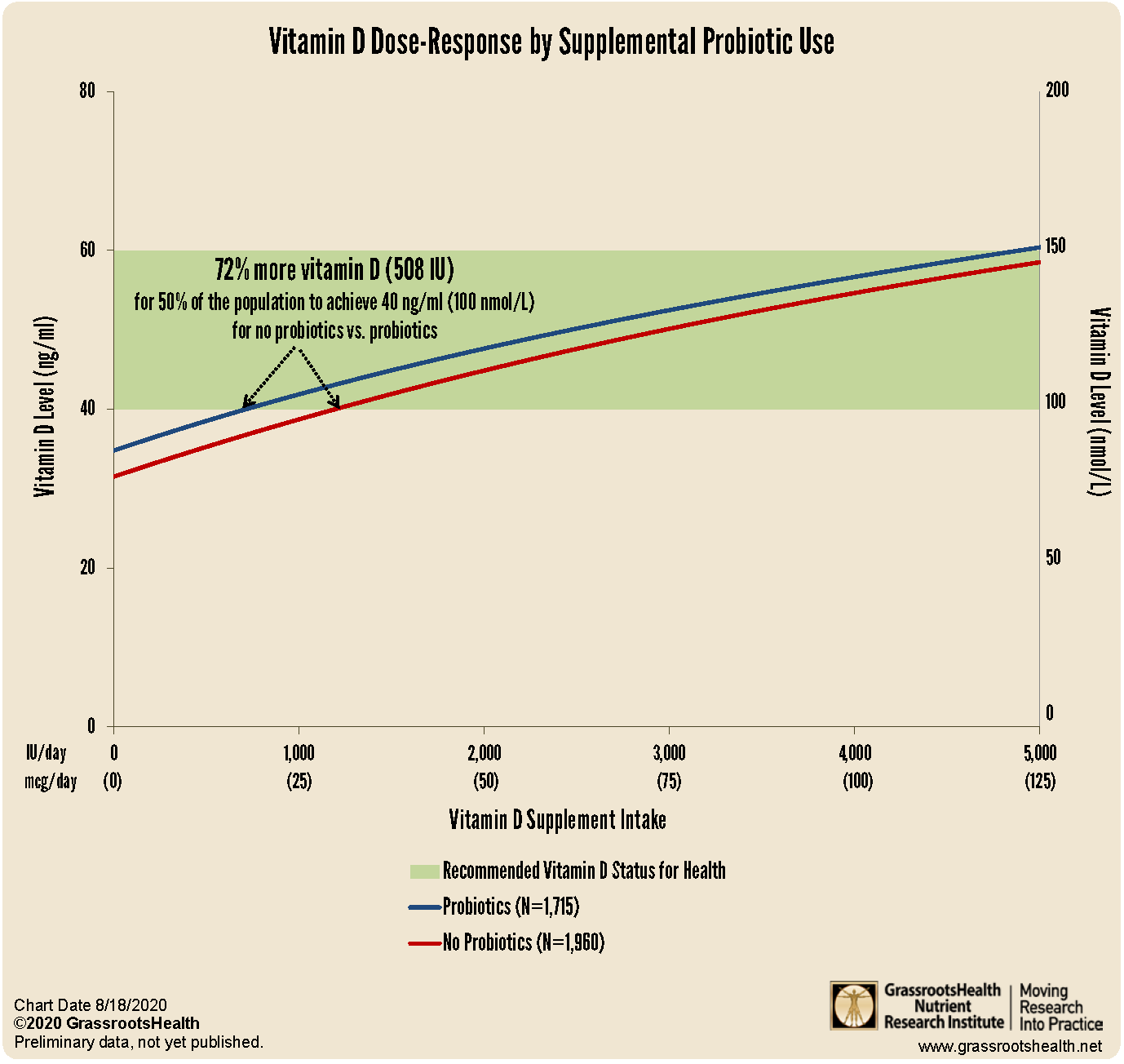Published on August 25, 2020

The relationship between probiotics and the gut microbiome, and vitamin D
Key Points
- Studies have shown a link between the amount of beneficial bacteria in the gut and vitamin D supplementation/UVB exposure; other studies have demonstrated that probiotics are effective at improving vitamin D absorption and increasing expression of the vitamin D receptor (VDR)
- A preliminary analysis of GrassrootsHealth data shows that on average, those taking supplemental probiotics have a higher vitamin D level for any given vitamin D intake amount than those not taking supplemental probiotics; specifically, 72% more supplemental vitamin D was needed for 50% of the population to achieve 40 ng/ml (100 nmol/L) for those did not take probiotics compared to those who did
 Probiotics aid digestion, improve the absorption of nutrients, and help keep balance in the gut microbiome. A recent study by Bosman et al. showed a link between the amount of beneficial bacteria in the gut and individuals supplementing with vitamin D or receiving UVB exposure. Some studies have also demonstrated that probiotics are effective at improving vitamin D absorption and increasing expression of the vitamin D receptor (VDR). In today’s blog we will investigate whether supplemental probiotic intake affects vitamin D levels among GrassrootsHealth participants.
Probiotics aid digestion, improve the absorption of nutrients, and help keep balance in the gut microbiome. A recent study by Bosman et al. showed a link between the amount of beneficial bacteria in the gut and individuals supplementing with vitamin D or receiving UVB exposure. Some studies have also demonstrated that probiotics are effective at improving vitamin D absorption and increasing expression of the vitamin D receptor (VDR). In today’s blog we will investigate whether supplemental probiotic intake affects vitamin D levels among GrassrootsHealth participants.
Supplemental Probiotics Intake and Vitamin D Dose-Response among GrassrootsHealth Participants
Using the data provided for the GrassrootsHealth study from over 3,500 participants with supplemental probiotic information, we plotted every participant’s supplemental vitamin D intake (dose) and blood level (response) and determined the average trends for participants who reported taking supplemental probiotics and those who reported taking no supplemental probiotics.
This preliminary analysis shows that on average, those taking supplemental probiotics have a higher vitamin D level for any given vitamin D intake amount than those not taking supplemental probiotics. Specifically, 72% more supplemental vitamin D was needed for 50% of the population to achieve 40 ng/ml (100 nmol/L) for those did not take probiotics compared to those who did.
Protect Your Immune Health by Avoiding Vitamin D Deficiency!
Your vitamin D level matters! In fact, one study showed an almost 60% increased risk in COVID-19 infection for individuals whose vitamin D level was below 30 ng/ml (75 nmol/L) compared to individuals whose vitamin D level was 30 ng/ml or higher. The same study also found that among the COVID-19 positive individuals, there was an almost doubled risk of hospitalization for those whose vitamin D levels were below 30 ng/ml. Ensure your vitamin D and other nutrient levels are within range! Help support a healthy immune system and more by testing today to find out your level of vitamin D and other nutrients important for a healthy immune response.
Are You Getting Enough Vitamin D?
Do you know what your vitamin D level is? Be sure to test today to find out, and take steps to keep it within a target of 40-60 ng/ml or 100-150 nmol/L! Give your immune system the nutrients it needs to support a healthy you and protect yourself from unnecessary diseases.
Through GrassrootsHealth Nutrient Research Institute, you can also test your essential elements magnesium, copper, zinc and selenium, toxins such as lead, mercury and cadmium, as well as your omega-3 levels, inflammation levels and thyroid stimulating hormone (TSH) level. Find out your levels today! Log on to the test selection page (click the link below) to get your tests and see for yourself if your levels can be improved.
Make sure you track your results before and after, about every 6 months!
How can I track my nutrient intake and levels over time?
To help you track your supplement use and nutrient levels, GrassrootsHealth has created the Personal Health Nutrient Decision System called
For each specific supplement, you can track what days you take it, how much, and many other details. This will help you know your true supplemental intake and what patterns of use work for you to reach and maintain optimum nutrient levels. Check it out today!








